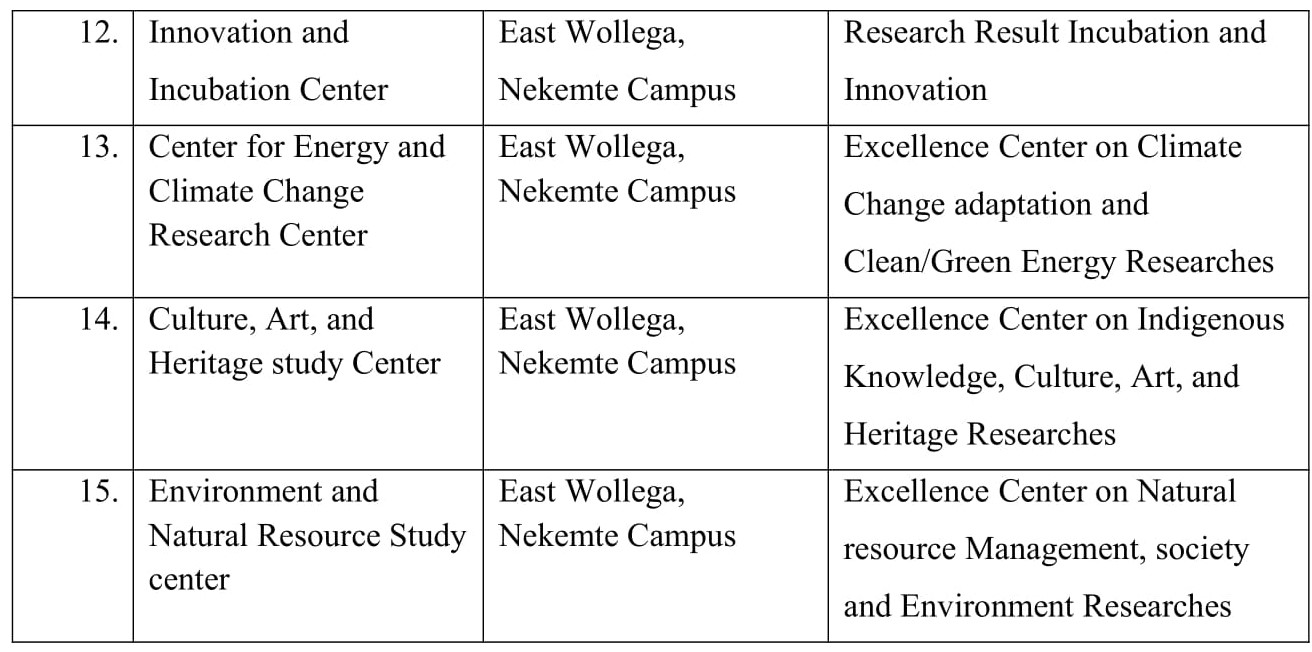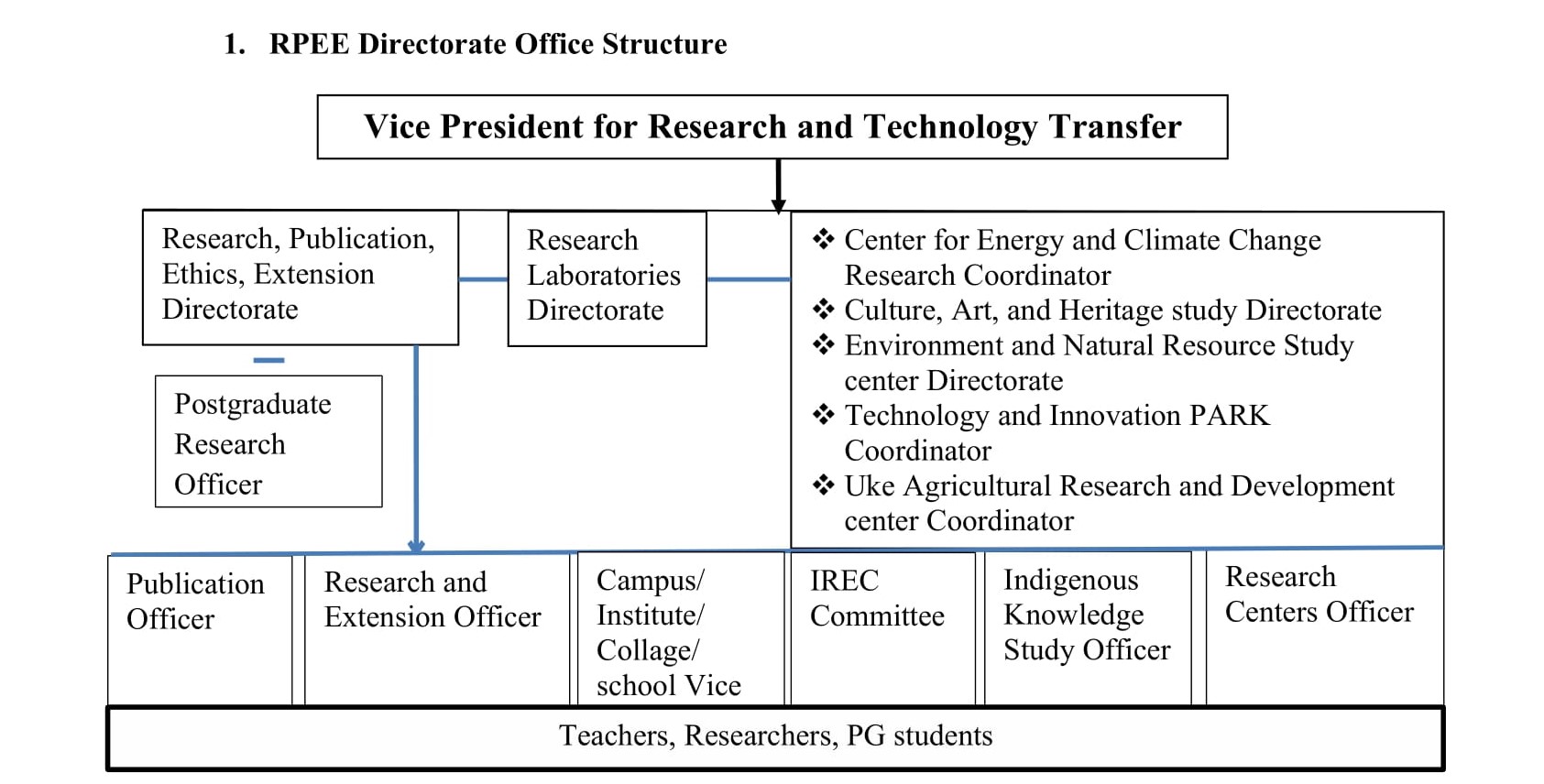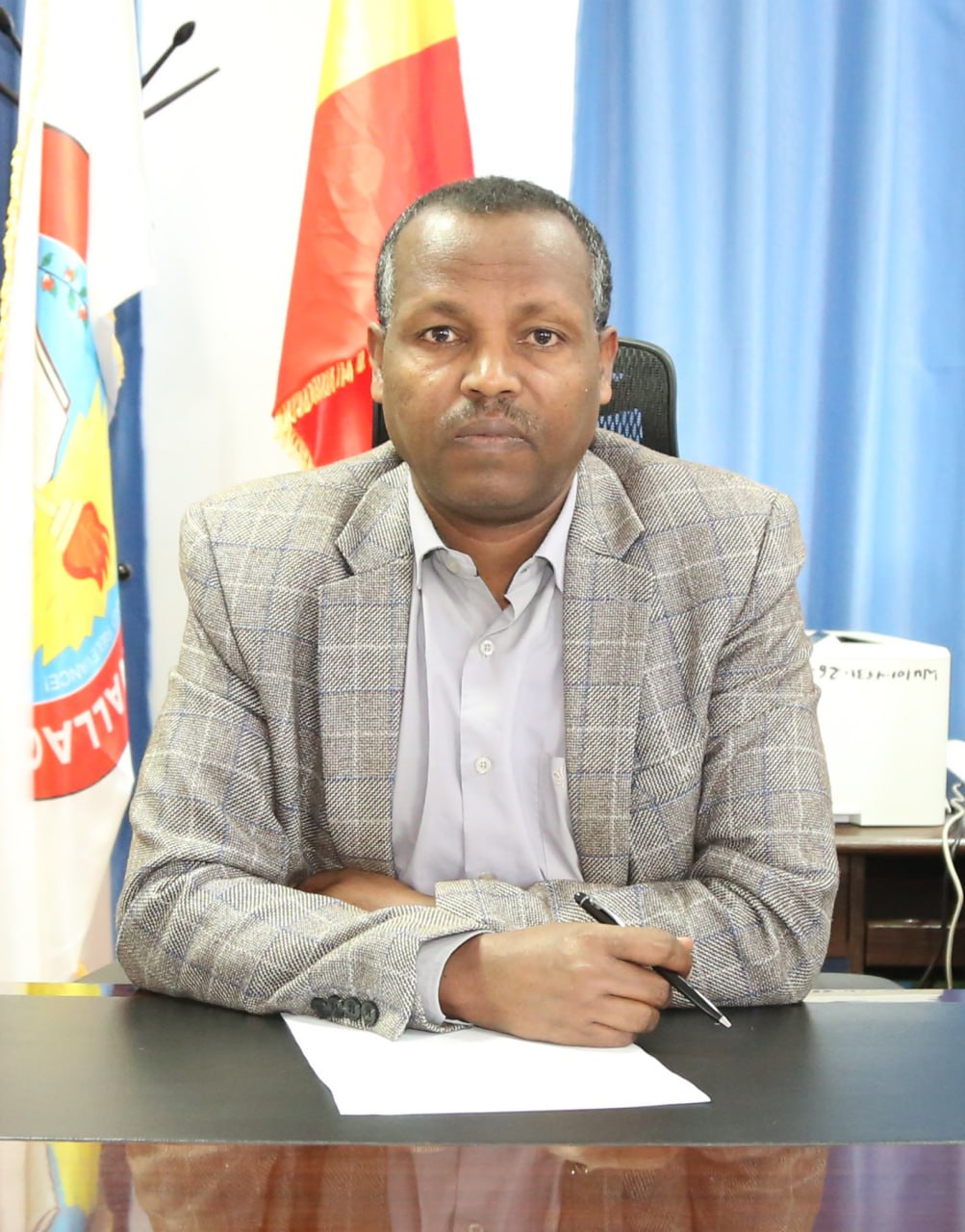There are fifteen research centers/sites in Nekemte, Gimbi, and Shambu campus of Wollega University mainly for researches and students practical attachments. The name of the centers/sites are listed in the table below


There are fifteen research centers/sites in Nekemte, Gimbi, and Shambu campus of Wollega University mainly for researches and students practical attachments. The name of the centers/sites are listed in the table below


Wollega University is an applied public university dedicated to conducting research to address real-world issues in the community. With multidisciplinary, interdisciplinary, and transdisciplinary initiatives, it is a theme approach that emphasizes problem-solving via inventions, research, and technological imitation/adaptation. Research and innovation outcomes are claimed for intellectual property rights (patents), anticipated to be published in journals with a Scopus index, incubated, and matured products are then distributed to communities or industries. For groups that are interested, some research findings are prepared into policy briefs. Prior to starting data collecting, each investigator must obtain ethical clearance, from the University Research Ethics Committee (IREC).

The RPEE directorate office has one director and four officers, viz. a publication officer, an Indigenous Knowledge Study Office officer, a research center officer, and a research extension officer. The office also coordinates the university research ethics standing committee (IREC), which has seven members organized from professionals of different disciplines and community representatives. The officers are listed as follows:
A Center for Energy and Climate Change, of Wollega University, could envision a sustainable future powered by clean energy, with a mission to promote energy efficiency and combat climate change through research, education, and policy advocacy, aiming to achieve a low-carbon economy and resilient communities.
Vision:
We aspire to be a leading to be the center of choice for innovative and applied energy and climate change and adaptation research and training
Mission:
Conduct research, develop and disseminate knowledge, and advocate for policies that support the transition to a low-carbon energy system.
Develop and implement strategies to reduce greenhouse gas emissions and help communities become more resilient to the impacts of climate change.
Engage with local communities, provide education and training, and support local initiatives that promote sustainable energy and climate action.
Work with policymakers to develop and implement policies that support sustainable energy and climate action.
Our Aim
The aim of the Center for Clean Energy & Climate Change is to further increase, enhance and synergise cross Faculty and external research collaboration in clean energy and climate change. These would enhance and develop the existing expertise in these areas.
Research topics
Our research has two main themes: clean energy and climate change.
Clean Energy
 Wollega University is one of the second generation public higher education institutions established in 2007. Recently the University is categorized among the fifteen Ethiopian universities differentiated as University of Applied Sciences (UAS). This designation marks a significant milestone in its journey toward excellence in applied research and innovation. The Research and Technology Transfer Office of the university is currently working at vice president position. The office is recently restructured into five directorates and three coordinators all of which focus on research, community engagement, industry linkage and STEM (Sciences, Technology, Engineering and Mathematics). Office of the Vice President for Research and Technology Transfer aspires to excel in knowledge, Innovation, Technology to enable Wollega University to be one of the top Universities of Applied Sciences in Africa by 2034. The university strides to generate and transfer new knowledge, innovation and technology that can transform the livelihood of the community via producing competent and creative researchers. The Research and Technology Transfer office of the university values creativity and innovation, excellence, quality, ethics, team work, commitment, partnership and accountability.
Wollega University is one of the second generation public higher education institutions established in 2007. Recently the University is categorized among the fifteen Ethiopian universities differentiated as University of Applied Sciences (UAS). This designation marks a significant milestone in its journey toward excellence in applied research and innovation. The Research and Technology Transfer Office of the university is currently working at vice president position. The office is recently restructured into five directorates and three coordinators all of which focus on research, community engagement, industry linkage and STEM (Sciences, Technology, Engineering and Mathematics). Office of the Vice President for Research and Technology Transfer aspires to excel in knowledge, Innovation, Technology to enable Wollega University to be one of the top Universities of Applied Sciences in Africa by 2034. The university strides to generate and transfer new knowledge, innovation and technology that can transform the livelihood of the community via producing competent and creative researchers. The Research and Technology Transfer office of the university values creativity and innovation, excellence, quality, ethics, team work, commitment, partnership and accountability.
The university has implemented the research reform agenda initiated by Ethiopian Ministry of Education, of which thematic approach of research projects and differentiating as mainly applied research was practiced. Accordingly, there were eight research thematic agenda identified by the university based on the national research priorities. These include agricultural productivity, agro-processing and agribusiness; manufacturing, mining & digitalization; health, nutrition and wellbeing; energy, environment and development; education quality; natural and computational sciences; institutions, governance and the rule of law; society, art and culture.
Research outputs are disseminated to end-users through various platforms, including university-hosted symposia, conferences, field days, publications in academic journals, and outreach activities utilizing media channels such as the university’s FM radio station and social media platforms. The university is also devoted in community engagement activities with the main focus on knowledge and technology transfer. To achieve this, there is partnership and collaboration bridged at all levels such as local, national and international scopes in order to strengthen academics, research and community engagement endeavors.
Recognizing the importance of nurturing future innovators, the university also engages in STEM-focused programs aimed at encouraging talented high school students from the East Wollega, Horro Guduru Wollega, and West Wollega zones. These initiatives are designed to unleash young students' creative potential, fostering a new generation of problem-solvers and innovators. Wollega University remains steadfast in its mission to be a beacon of applied knowledge, innovation, and community transformation.
Diriba Diba (PhD)
Vice president for Research and Technology Transfer, Wollega University
Email:
Main Campus (Nekemte)
Gimbi Campus(Faculty of Social Science and Humanity, Resource Mgmt. and Economics, Natural and Environmental Science , Business and Development )
Shambu Campus(Fuculty of Agriculture, Technology, Resource Mgmt. and Economics )